CRJ 15:1 out now!
CRJ 15:1 is being mailed out next week. Digital subscribers will have access as of Monday, March 9, 2020, although we have made several articles free to read for everyone. This edition, we cover the Australian bushfires, frontline response, business continuity - including preparations for Brexit, leadership, stress and Covid-19. We also look at communities, in terms of conflict, peacebuilding, spontaneous volunteers, emergency preparedness for children and cultural understanding. This edition features security, with a look at online security, training for cybersecurity and attacks on emergency public services, as well as counterterrorism in cities. We examine tech for good, tall buildings and feature a special eight-page supplement on the DRIVER+ project. Read on for more details...
Getting the ‘wrong’ people around the table
When faced with a crisis that requires complex problem solving and creative thought, it is vital to consider cognitive diversity. This is backed up by research that shows how hierarchy is detrimental to human co-operation, regardless of whether this hierarchy has been earned or is arbitrary. CRJ Advisory Panel Member Robert McAlister discusses
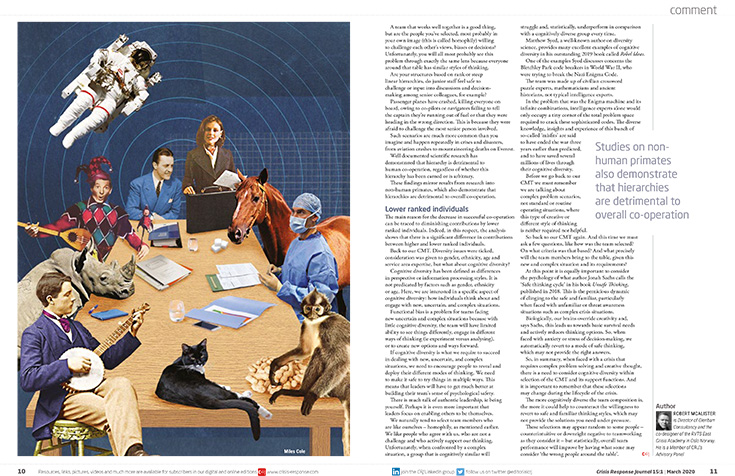
A metaphor for our times
Since the Gray Rhino: How to Recognise and Act on the Obvious Dangers we ignore was published in 2016, the world has faced many risks that defy the myth of the unforeseeable, improbable black swan. How has the grey rhino concept changed our thinking in the world of crisis and disaster management? Emily Hough speaks to author Michele Wucker
Mitigating disasters in a fractured world
“In a world where major governments are choosing their own countries first, we are fighting disasters with one hand tied behind our backs,” says CRJ Advisory Panel Member Amy Pope, who shares lessons from her time on the National Security Council under President Barack Obama’s administration, combined with her private sector experience
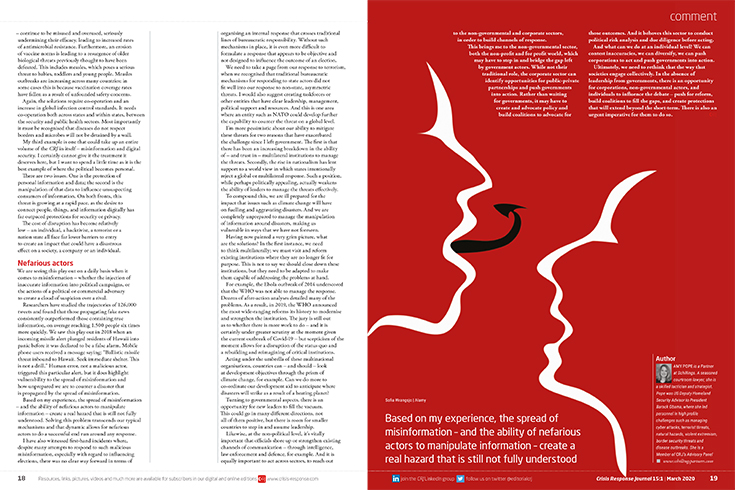
Australian bushfires
Fire Service response
The environmental and personal impacts of the recent bushfires are substantial, says Mark Jones, Chief Officer at South Australia Country Fire Service
Operation Bushfire Assist
Emily Hough speaks to Senator the Hon Linda Reynolds, CSC, Minister for Defence for the Australian Government. This short interview reports on how Australia’s armed forces assisted in bushfire response and recovery
When can we talk frankly about climate change?
CRJ Advisory Panel Member Christine Jessup contends that we all need to play our part in adapting to climate change for our survival and that now is the time to talk openly and honestly about the challenges of the 21stcentury
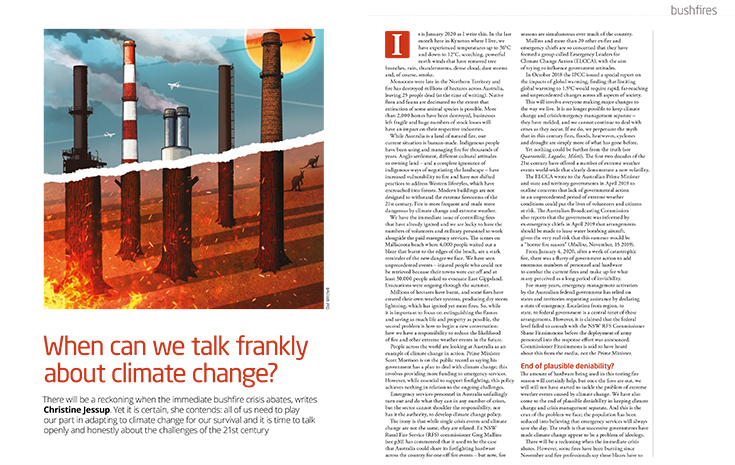
Is a total rethink our moral responsibility?
Greg Mullins, former Commissioner of Fire and Rescue, New South Wales, tells Christine Jessup his thoughts on the recent bushfires, extreme weather and climate
Frontline response
Albania earthquake
John Doone reports on the response from Kosovo’s Security Force and emergency services when earthquake-hit Albania reached out for help from its neighbours
A peek into the future with Singapore’s Civil Defence Force
Emily Hough catches up with Commissioner Eric Yap of the SCDF to learn more about the force’s trailblazing technology
INSARAG anniversary
The International Search and Rescue Advisory Group celebrates its 30ths anniversary this year. Lucien Jaggi describes its achievements to date and what it plans for the future
Continuity & Resilience
Is business continuity headed in the right direction?
“The business continuity professional is certainly not a one-man band,” says Lyndon Bird. “Rather, they are like the conductor of an orchestra – they almost certainly cannot play all of the instruments, but they know how they must work together to create the best musical outcome.” Here, he argues that cyber is just one of a portfolio of risks that need to be addressed
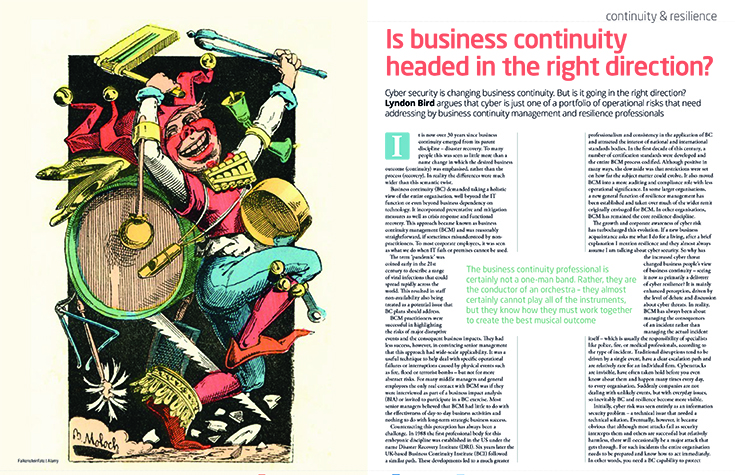
The role of enterprise risk management in an ambiguous, volatile and complex world
There is much discussion among risk practitioners about the approach to, and value of, enterprise risk management. Some believe it is an essential methodology for governance, while others consider it to be utterly useless. Hans Læssøe says the answer lies somewhere in the middle
Creating resilience from turmoil
Brexit is not unique, says Adrian Clements. While it is worrying for many, it is a breath of fresh air for others and the UK can, if it is willing to take the risk and move forwards, develop a social security system able to cope with future needs and which can embed opportunity management into the governance process
Readying a frontline service for Brexit
Alex Darling describes how a UK ambulance service’s preparations to mitigate potential negative effects of Brexit have presented an opportunity to revisit and revalidate established working practices
Leadership
The predictable and preventable panic of an infectious disease outbreak
Most people are not educated in epidemiology and cannot differentiate between accurate information, speculation and fearmongering when it comes to challenges such as Covid-19. This is where the actions of leaders can make the difference between panic and calm concern, says Advisory Panel Member Eric McNulty
Performing under pressure
Anna-Maria Rochester describes some lessons learnt from her research into stress management strategies of hostage negotiators, lessons that she says are equally applicable to anybody who has to perform in stressful situations
DRIVER+ special feature
The DRIVER+ project, which has been running throughout Europe for the past two-and-a-half years, has drawn to a close. But its achievements and sub-projects are continuing, delivering valuable benefits to crisis managers in Europe and around the world. Stephen Prendergast reports on the project’s activities, results and enduring legacy in this eight-page special focus
Communities
A centre of hope
In general, children and young people with disabilities in Cambodia – many of these caused by the legacy of a brutal civil war – have difficulties in accessing education and employment. Nigel Ellway describes a project that is bringing hope to these communities, thanks to the work of the Sir Bobby Charlton Foundation
Transformative versus technical peacebuilding
Larissa Sotieva and Juliet Schofield argue for a return to a transformative model of peacebuilding, saying that such a model places emphasis on understanding the psycho-socio-political aspects of conflict
Strategic and individual cultural understanding
Advisory Panel Member Matt Minshall says that the responsibility to be aware of other cultures is a vital component in the successful management of crises
Citizens: Vital co-actors in security
Gilles Mahieu, Governor of Brabant Wallon in Belgium, describes how collaborative agreements have been signed with several partner associations in order to ensure that citizens are well prepared for an emergency
Unprompted acts of kindness
Ali Malvern questions whether the current siloed approach of ‘professionals versus society’ is resulting in the desired effects. She says that as with all forms of emergency management, it is time for a more integrated approach and seeking to develop a framework to include spontaneous volunteers
Emergency preparedness for children
First aid and emergency preparedness values were previously passed down from generation to generation but the increased professionalism and effectiveness of first responders means that the public has effectively outsourced its safety and security to others. CRJ Advisory Panel Member Rob Fagan argues that these generations of lost knowledge can be brought back quickly by involving children in disaster education and preparedness
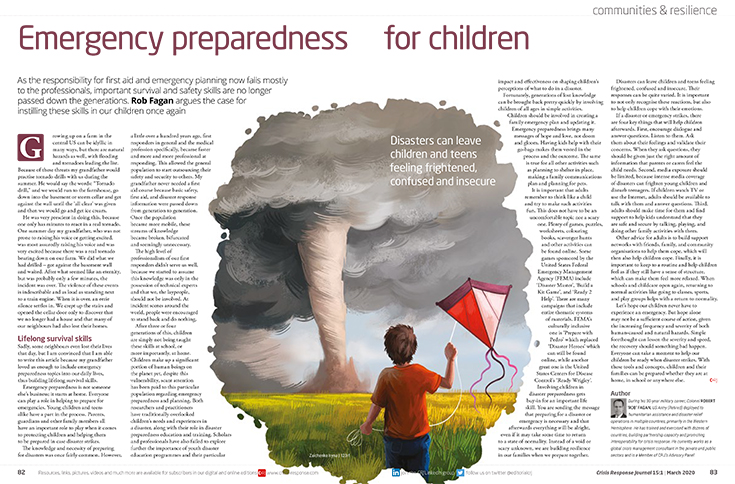
Testing in the Caribbean
Advisory Panel Members Alois Hirschmugl and Albrecht Beck, along with Anna Lena Huhn describe the European Union Caribbean Coast exercise last year, which involved thousands of participants
Technology
Enhancing humanitarian learning through virtual reality
The Humanitarian Leadership Academy is currently testing two core types of VR experience – interactive and non-interactive – explain Atish Gonsalves and Anne Garçon
The dangers lurking in our digital shadows
Ghonche Alavi says the digital footprints we leave behind can threaten our security, describing how small snippets of information can come together and very quickly give criminals substantial intelligence. Here, she offers advice on minimising online threats

Creating leaders on the cyber battlefield
What leadership skills and qualities are needed when dealing with a cyber incident? Jeffrey Crump explores practical ways to conduct effective and comprehensive cyber crisis management training
Cyber threats: What emergency services need to know
Public safety organisations can be – and often are – the targets of malicious attacks. Beatriz Peon provides some sobering real-life cases, and investigates how to navigate the risks emerging from public safety’s digital transformation
Crisis mapping
Although formal humanitarian entities continue to be the mainstay of crisis efforts, they are no longer the sole players in the humanitarian sphere and it is important that we understand the relationship between digital volunteers and the formal humanitarian sector, according to Doug Specht
The global impact of drones for good
Charles Werner lists the numerous ways that drones are being used to save lives and protect communities, and encourages first responders to join a not-for-profit that has been formed to help public safety agencies to communicate, co-ordinate and collaborate about implementing drone programmes
Cities
Counter-terrorism in cities: A whole system approach
Terrorism is a global, networked and persistent threat, so counter-terrorism must also be global, networked and persistent, says Alex Townsend-Drake
Tall buildings and high reliability
Everyone involved in high-rise buildings should look to high reliability organisations for inspiration, according to Shane McMahon
Public health
How health systems are critical to emergency preparedness
This article by Tasnim Atratah, Jarno Habicht, Oskonbek Moldokulov, Kaliya Kasymbekova, Netred Emiroglu and Dorit Nitzan describe work done by the World Health Organisation and the government in the Kyrgyz Republic
Hospitals: Delivering a different approach
Ruth Wozencroft explores whether it is necessary to redesign or redevelop out-of-date hospitals to avoid a catastrophic event or the dilution of quality care
Regulars
Events - Aid workers meet in Geneva
Nearly 3,000 people gathered at this year’s Humanitarian Networking Partnerships Week in Geneva, Switzerland, report Claire Sanders and Emily Hough
Events - Asia: Nature’s ‘disaster laboratory’?
Asia is the world’s largest continent by area, home to almost four-and-a-half billion people. Approximately 45 per cent of the world’s disasters caused by natural phenomena occur in the region, says Andrian Cader, as he introduces the Asia Disaster Management and Civil Protection Expo and Conference
Frontline: the future is in our hands
Claire Sanders speaks to Heather Beal, President and CEO of Blocks, a non-profit organisation that aims to build preparedness into childcare programmes
Crisis Response Journal is available to subscribers - to find out more about our offers and subscription rates, click here